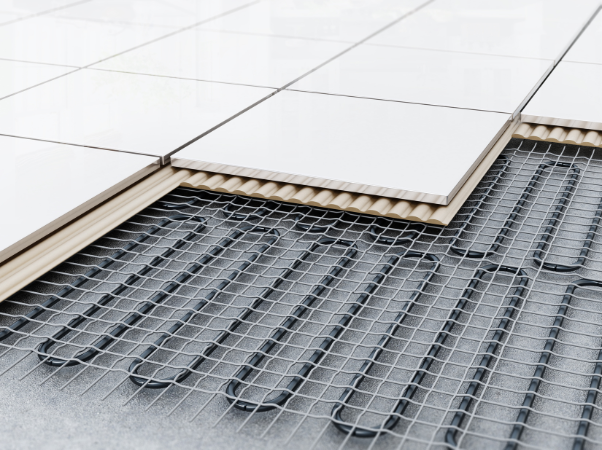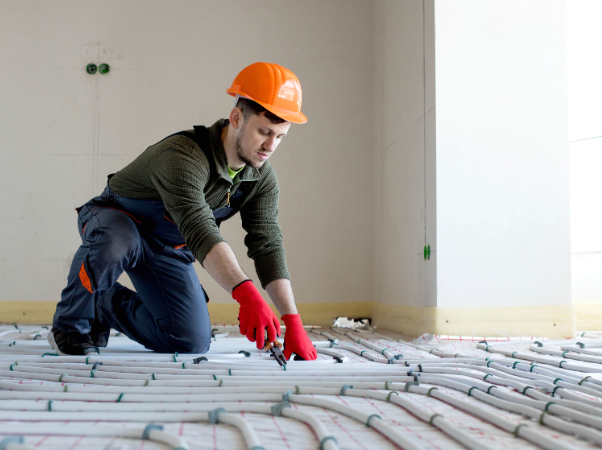Underfloor Heating Installer Guide
Looking to upscale your installation offerings? Underfloor Heating is more popular than ever, due to increased home heating efficiency and the additional room space they provide.
Take advantage of the increased demand and learn more about Wet & Dry Underfloor Heating installations.

What Is Underfloor Heating?
Underfloor heating is an energy-saving, low-maintenance option that can be used as a property's additional heating source or as the main heating solution, depending on several factors. Working on a system of wires or pipes, underfloor heating can be laid under most property's floor surfaces.
With customers now looking for ways to beat the energy price increases and heat their homes and properties in a more energy-efficient way, underfloor heating has become increasingly popular with homeowners, businesses, and housing associations all looking for cost-effective heating solutions.
Though there are two main underfloor heating systems available, some properties are better suited to electric underfloor heating, while others will benefit more from a water underfloor heating system.
For further information and guidance on underfloor heating, take a look at our underfloor heating buying guide.
Best Types of Underfloor Heating to Install:
The two main types of underfloor heating for installers to consider recommending to customers include electric and water. Both have their advantages and disadvantages and their suitability for each customer will vary depending on the property type.
- Electric Underfloor Heating Systems
Using a selection of mats and cables, electric underfloor heating is a simple installation process that is recommended as a quick project for properties where rooms are smaller, and those that are looking to supplement their current heating sources.
An electric underfloor heating system also works well in those properties with awkwardly shaped rooms, existing rooms that demand little installation disruption, and in rooms where the floor height increase is kept to a minimum.
What’s more, electric underfloor heating is considered more budget-friendly, so for those customers where upfront costs are limited, this could be the better option.

- Water Underfloor Heating Systems
Using a series of pipes that connect to a boiler via the manifold, water underfloor heating is a slightly more complex installation process but ideal for those larger properties and rooms. This system type is also considered a better choice when heating multiple rooms in a property as it can be controlled remotely and control different zones at different temperatures.
Best of all, it’s perfect for installing in new builds and when undertaking full refurbishment in properties and works ultra-efficiently in well-insulated areas. Plus, water underfloor heating systems are an option for those rooms that are prone to high heat loss, for example, conservatories, and where floor height is restricted.
Water underfloor heating is initially a little costlier than electric underfloor heating, yet is considered more cost-effective to run long-term. Water UFH is also cheaper than radiators to run, due to the lower flow temperatures.

What Qualifications Do Installers Need to Install Underfloor Heating?
Though there isn't an official qualification or registration yet for installing underfloor heating systems, qualified and certified plumbers, heating engineers, and electricians with trade experience are perfectly placed to add this type of installation work to their repertoire.
Do You Need An Electrician to Install Underfloor Heating?
For electric underfloor heating, registered electricians are required to complete and confirm the final connections and undertake any circuit alterations needed.
Can a Plumber Install Underfloor Heating?
While MCS Accreditation isn’t required to install UFH, those MCS-accredited members are in an ideal position to undertake this work to help further complement their ability to recommend and install low-carbon energy-efficient solutions.
For further information on becoming MCS accredited, check out the MCS website. The Checkatrade website is also a good place to promote your ability and credentials to install underfloor heating. These industry-renowned websites are also trusted by customers looking for professional and reputable installers to install underfloor heating systems.
Is Underfloor Heating Expensive?
The Renewables Team at City Plumbing provides several underfloor heating solutions to suit all customers’ needs and indeed budgets. However, installers will also need to factor in:
- The suitability of underfloor heating systems chosen by the customer (whether the system is the correct choice for their property - with water systems costing more to buy and install as opposed to electric solutions)
- The customer's property type and age of the building ( whether a retrofit or a new build)
- The sizes and layout of the room/s
Alongside the costs of purchasing the underfloor heating system, installers will need to add their costs for labour. Yet, when recommending underfloor heating systems to customers, there's fantastic scope for installers to emphasise the many benefits of energy-saving and money-saving potential.
How Long Will Underfloor Heating Last?
When the most reputable and suitable underfloor heating product is selected for a customer's property, you can expect pipework to typically carry warranties of up to 50 years. Other components such as actuators or pumps will require replacing over time but are relatively easy to swap.
How Can Underfloor Heating Help Customers Save Energy and Money
- Underfloor heating self-regulates thus keeping a consistent temperature throughout. Providing an even spread of warmth, it eliminates cold spots thus ensuring customers don't have to keep turning that thermostat dial up to find the right balance.
- By adding a smart thermostat to underfloor heating, it can be left on at an energy-efficient temperature throughout the day to ensure total comfort while still keeping energy bills low.
- Underfloor heating uses temperatures of around 35 to 50 ° when heating fully, thus heating quicker and more efficiently and sustaining a lower temp than radiators which work to 75 to 85 °.
- Underfloor heating provides hours of residual heat. This means customers can benefit during the evening from a comfortable temperature as well as ensuring their property remains energy-efficient even when not in use.
- Effortless to run when installed, underfloor heating is a low-maintenance option that helps customers long-term as ongoing care and maintenance bills are eliminated.
- Underfloor heating works well with a variety of floor choices, ensuring that customers don't have to factor and replacing their current flooring choices, which can be costly.
What Other Products Can Installers Recommend to Work with Underfloor Heating?
Ultimately, installers are perfectly placed to recommend several low-carbon technologies that fully complement underfloor heating systems. The most popular and energy-efficient options include an air source heat pump and a ground source heat pump.
Heat pumps only require a low input temperature to work well, and so too do underfloor heating systems. More efficient at lower temperatures than standard boiler systems, they also sustain heat at lower temperatures over longer periods.
By helping customers understand the many benefits of combining low-carbon technologies, installers can play an active role in helping the UK government hit its net zero target by 2050.
Learn More and Become MCS-accredited with City Plumbing and GTEC
We've partnered with GTEC to offer MCS-accredited training to take your renewable installations to the next level.
Learn how to install Solar, Air Source & Ground Source Heat Pumps, EV Chargers, and all other main types of renewable technology. Become certified to upskill your business and take advantage of increased demand ahead of net zero.





